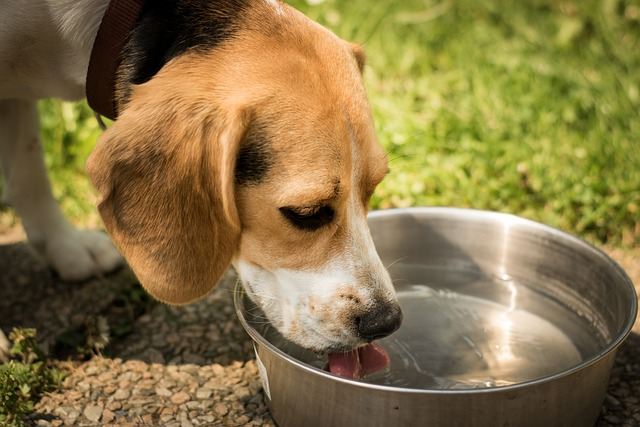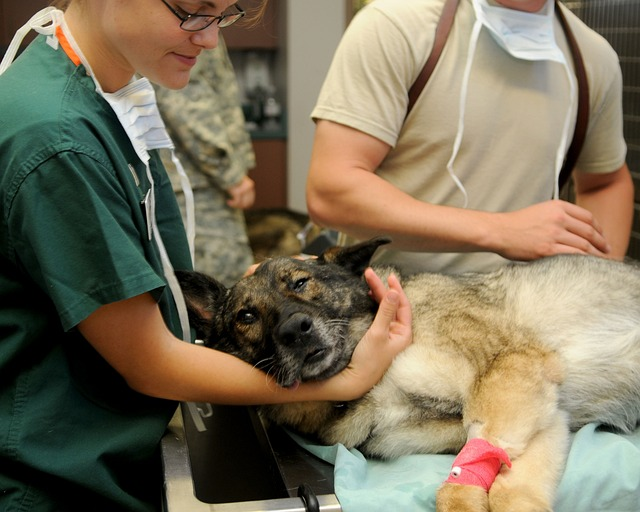What Does It Mean When an Older Dog Starts Drinking a Lot of Water? Find Out the Possible Causes and Solutions!

As our beloved pets age, we may notice changes in their body weight, behavior, and habits, including an increase in their water consumption.
What does it mean when an older dog starts drinking a lot of water?
While it’s normal for most dogs to drink water from their water bowl throughout the day, excessive thirst in older dogs can be a cause for concern.
In this article, we will explore the possible reasons behind this change and provide insights into the potential underlying health conditions.
If you’ve noticed your senior dog drinking excessively from the water bowl, it’s essential to understand the possible causes and consult with your veterinarian for proper diagnosis and treatment.
What Does it Mean When an Older Dog Starts Drinking a Lot of Water?

Senior dogs may experience various health issues that can contribute to drinking excessive amounts of water.
Understanding the reasons behind excessive thirst can help in identifying potential underlying conditions.
Some of the common medical conditions include kidney disease or kidney failure, diabetes mellitus, diabetes insipidus, urinary tract infections, Cushing’s syndrome (or Cushing’s disease), and liver infection.
It’s important to monitor your dog’s water intake and observe for other symptoms that may accompany increased thirst.
If you notice any abnormalities or significant changes in your dog’s behavior, it’s crucial to seek veterinary attention for proper diagnosis and treatment.
Kidney Disease Or Kidney Failure
One possible cause of excessive drinking in senior dogs is kidney disease or kidney failure.
The kidneys play a vital role in regulating water balance in the body. When they malfunction, they may not efficiently concentrate urine, leading to increased water intake.
Other signs of kidney failure may include changes in appetite, weight loss, and increased urination.
Your veterinarian may recommend blood tests and a urine sample analysis to evaluate kidney function and determine the best course of treatment.
Repeated infections can also cause chronic kidney disease which can lead to permanent water imbalance in your dog!
Diabetes Mellitus
Diabetes mellitus, a condition characterized by high blood sugar levels, can also result in increased thirst and water consumption in dogs.
Insufficient production or utilization of insulin leads to an inability to properly regulate blood sugar levels.
Dogs with diabetes mellitus may display increased appetite and changes in body weight, such as weight loss. Frequent urination and increased thirst are also a sign of impaired glucose metabolism.
Diagnosis typically involves blood tests and urine analysis to evaluate excess glucose levels and assess overall health. Treatment may involve insulin therapy, dietary changes, and regular monitoring.
Diabetes Insipidus
Unlike diabetes mellitus, which affects blood sugar levels, diabetes insipidus is a condition that affects the body’s ability to regulate water balance.
Dogs with diabetes insipidus experience excessive urination, leading to excessive thirst and increased water intake.
This condition is relatively rare and can be caused by either insufficient production of the antidiuretic hormone or kidney resistance to its effects, such as in severe kidney failure. Diagnosis may involve water deprivation tests and hormone level assessments.
Treatment options vary depending on the underlying cause and may include medication or hormone replacement therapy.
Urinary tract infection
Urinary tract infections (UTIs) can cause increased thirst and urination in dogs.
Bacterial infections in the urinary tract can lead to inflammation and irritation, resulting in the need for more water to flush out the system.
Along with increased water consumption, other symptoms of UTIs may include frequent urination, difficulty urinating, and blood in the urine.
UTI may be caused by bad hygiene, bladder stones, and frequent urinary accidents. A sign of urinary infection may be an abnormal smell coming from your dog’s urine.
Your veterinarian may recommend a physical exam, urine sample analysis, and possibly antibiotic treatment to resolve the infection and alleviate associated symptoms.
Cushing’s syndrome
Cushing’s syndrome, also known as hyperadrenocorticism, occurs when the adrenal glands produce excessive cortisol, a stress hormone. This condition can increase your dog’s water consumption.
Other clinical signs of Cushing’s disease include increased appetite, weight gain, lethargy, and hair loss.
Your veterinarian may conduct tests, such as a complete blood count and hormonal analysis, to diagnose Cushing’s disease.
Treatment options for Cushing’s disease may include medication to regulate cortisol levels or, in some cases, surgical removal of adrenal glands.
Liver Infection
Liver infections, such as hepatitis, can cause excessive water drinking. Inflammation and damage to the liver can disrupt its normal functioning, leading to increased thirst.
Dogs with liver infections may also experience loss of appetite, vomiting, jaundice (yellowing of the skin and eyes), and abdominal pain.
Your veterinarian may perform tests and imaging studies to assess liver function and identify the underlying cause of the infection.
Treatment may involve medications, dietary changes, and supportive care to help manage the condition.
One More Reason Why Your Dog Is Drinking A Lot Of Water
In addition to health conditions, one common reason for increased water intake in dogs is consuming dry food.
Dry kibble typically contains low moisture content, causing dogs to feel thirsty and drink more water to compensate.
If your dog’s diet consists primarily of dry food, consider adding wet or canned food to increase hydration.
However, it’s still crucial to monitor your dog’s water intake and ensure it aligns with their individual needs.
Diagnosing the Cause of Increased Water Intake
Determining the underlying cause of your senior dog’s excessive drinking requires a thorough veterinary evaluation.
Your veterinarian will conduct a comprehensive physical examination, review the dog’s medical history, and consider the observed symptoms.
They may recommend blood tests and urine sample analysis, which may reveal an increase in the number of white blood cells.
Imaging studies and other diagnostic procedures may also be used to identify any underlying health conditions contributing to the increased water intake.
It’s essential for dog owners to provide accurate information about their dog’s behavior, diet, and any changes they might have noticed to assist the veterinarian in making an accurate diagnosis.
What can I expect at the veterinarian’s office?

When you visit the veterinarian’s office regarding your dog’s excessive thirst, expect a thorough examination and diagnostic process.
The veterinarian will assess your dog’s overall health for clinical signs, conduct necessary tests, and discuss their findings with you.
Treatment options will depend on the identified cause, and the veterinarian will provide you with a tailored treatment plan.
It may include medication, dietary adjustments, lifestyle modifications, and regular monitoring.
Follow your veterinarian’s instructions closely and maintain open communication to ensure the best possible care for your senior dog.
Conclusion
Excessive water intake in older dogs can be indicative of underlying health conditions that require attention.
If you notice your senior dog drinking a lot of water, it’s crucial to consult with your veterinarian to determine the cause and appropriate treatment.
Conditions such as kidney disease, diabetes mellitus, urinary infections, Cushing’s syndrome, and liver infections can contribute to increased water intake.
With early detection, proper diagnosis, and timely intervention, many of these conditions can be managed, improving your dog’s quality of life.
Remember to provide fresh water at all times and maintain regular veterinary check-ups to ensure your senior dog’s well-being.
FAQs
How Much Water Should a Dog Drink Daily?
The ideal ratio is drinking 1 ounce of water for 1 pound of body weight for an average-sized dog.
Can medications cause excessive thirst in older dogs?
Anti-seizure medications, diarrhea medications, and antibiotics can cause dry mouth and consequently excessive drinking in dogs.
Why do old dogs suffer from problems that make them thirsty?
Older dogs are prone to diseases because of their weak immune systems. These diseases in turn affect the kidney, the liver, and the gut of the dog which can make the dog excessively thirsty.
